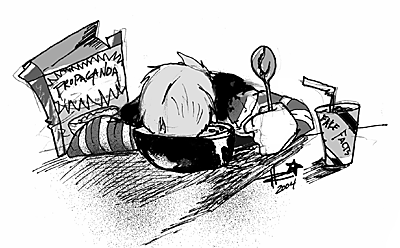
Illustration by Holly Randall
|
|
By Dan Post
Arizona Daily Wildcat
Thursday, January 27, 2005
Print this
A new class of infectious diseases is on the rise, affecting a unique demographic - journalists and the news media. This exclusive group is suffering a potentially deadly affliction that has affected their quality and integrity severely. Two of the causative pathogens have recently been identified.
One common journalistic bug is the nasty bacterial organism Fabricus factus (commonly called outright fraud).
The symptoms associated with these bacteria include stories that are too good to be true. The method of transmission is fascinating, though not uncommon. The disease enters into the body once the mind gives in to the pressures of money, power, sensationalism, unethical editors and the temptation to lie just becomes too great. This disease has caused the fatalities and dishonor of many in the news business; it has infected even the most impenetrable bodies.
Jayson Blair, formerly of The New York Times, and Jack Kelley, the renowned reporter of USA Today, among others, were found to have elevated F. factus counts after they were caught fabricating hundreds of stories.
Another pillar in the news world recently suffered a similar fate. In the fall, Dan Rather and CBS News aired a story accusing George W. Bush of irregular behavior while in the National Guard. When they were questioned about the story's validity, they stood behind their fact-checkers, even as the supporting evidence eroded away. Now an official review of the journalistic bungle reprimands the news agency for politicizing and fraudulent reporting. It's the typical symptom pattern for F. factus.
The solution for this disease is simple: the antibiotic fungi that fires reporters and editors, dismiss-icilin. Dismiss-icilin is a plant often found in the offices of large media corporations - it is panacea to keep bad publicity from reaching the highest rung. In the cases above, the drug has been administered liberally.
Blair and Kelley both lost their jobs thanks to dismiss-icilin. As well, several news chiefs at CBS have been medicated, and the speculation is that Dan Rather's retirement is linked to a dismiss-icilin treatment.
But Fabricus factus is really only an opportunistic infection that defeats journalists and news agencies already affected by a more serious strain. This viral disease is called Propaganda Under the Façade of Fact Syndrome (PUFF syndrome, or PUFFS). Everyone has heard of puff pieces, but PUFF Syndrome is the widespread occurrence of sensationalistic journalism meant to cater toward entertainment instead of information.
PUFFS has adverse symptoms that can easily be observed. Among other manifestations, every flashing cable-news alert, every Internet headline, every major broadcast news lead-in and even the top headlines of printed rags contain sensationalistic language to draw readers in. Stories go as negative as possible, under the belief that people only want to hear bad news. Political discussion is centered on bickering and one-upping, as opposed to critical debate.
Widespread PUFF Syndrome can only occur in today's environment that is geared toward ratings and profits. Ratings are the key cause of this epidemic; ratings equal dollars, and the consolidation of media sources into a handful of major corporations has demanded that profit, ratings and subjectivity replace journalistic integrity as the primary professional motivator. But it is the journalists who are taking the credibility hit for the consistently sensational reporting and editing choices, and average citizens are suffering from a lack of truth that is needed for an effective democracy.
But there is a preventative cure for PUFF Syndrome - it works like abstinence works to prevent AIDS.
No one is forced to watch or read anything they don't want to. People have the ultimate power to dictate how they get their news. If enough people stop getting their news from sources infected by PUFFS, maybe the media will be forced by ratings pressure to start showing quality and honorable reporting.
But where can information be located without going to the big media companies? Try getting news from an alternative media source. PBS is a good place to start - they are by far the least commercialized major news source, and they engage in informed debates about political and foreign policy issues - plus, you are already paying for it with your tax dollars. Tucson and the UA each have their own alternative media resources. Tucson has its own independent media collective (Arizona.indymedia.com), and those with UA library permission have access to a significant variety of print and online news sources from around the world that contain decent journalism. Also, the abundance of political journals in the library tends to have more analytical and insightful coverage of world events. Stop supporting the spread of PUFFS and other journalism diseases by getting news from these alternative sources; the media conglomerates will begin their long and needed road towards recovery.
Dan Post is an anthropology and ecology senior. He can be reached at
letters@wildcat.arizona.edu.
